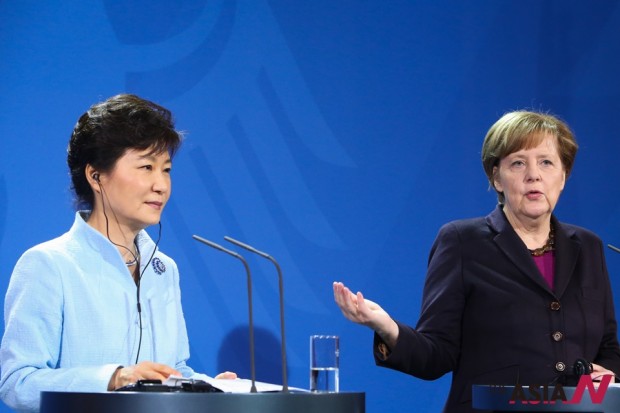
Pyongyang threatens nuclear, missile tests
President Park Geun-hye has a new dilemma over North Korea.
Park made a peace overture to Pyongyang during a recent visit to the German city of Dresden.
The North reacted to her “Dresden Doctrine” by firing missiles and threatening nuclear tests.
But Park remains calm. She has prevailed with aplomb during the North’s previous challenges, including last year’s “spring madness” that peaked in a crescendo of threats.
Her dealings with the North are a key factor in her high popularity ratings.
The secret of her success so far lies in her ability to keep reactions in check, while corralling the North with international consensus, backed by the United States and China.
It remains to be seen whether she will be able to stare down the North’s threats again.
The North’s Deputy UN Ambassador Ri Tong-il repeated Saturday that it will conduct a fourth nuclear test following the last one in early 2013.
“We made it very clear that we will carry out a new form of nuclear test. I recommend you to wait and see what it is,” Ri said in a news conference at the United Nations in New York.
Analysts are agonizing over trying to figure out the details of this new type of test. But they agree it will be a significant next step in Pyongyang’s nuclear weapons development. Some call it North Korea nukes 2.0.
Jeffrey Lewis, director at the James Martin Center for Nonproliferation Studies, noted that it would use highly enriched uranium or burn thermonuclear fuel. Another possibility is “salvo tests,” simultaneous detonations of multiple nuclear devices.
Ri’s remarks came following U.N. condemnation of the launch of two medium-range ballistic missiles by the North on March 26. The projectiles were capable of hitting Japan and were the first to be tested in four years. It also fired short-range rockets in the past month.
The belligerent regime recently notified Tokyo of new missile launches and live-fire exercises over the East Sea through April 17, according to a Japanese newspaper.
Seoul also discovered three suspected North Korean spy drones. Two of them crashed just south of the inter-Korean border after carrying out surveillance over Cheong Wa Dae and military facilities. On Sunday, another drone was found in a mountainous area on the east coast.
“Given that North Korea goes ahead with another atomic test, the U.N. will come up with strong sanctions on the country, which will respond with verbal attacks and additional provocations,” said Prof. Koh Yu-hwan at Dongguk University.
“However, it remains to be seen whether the North will actually do so, due to the risk of facing severe punitive measures on a global scale. Its threats might be geared toward just condemning ongoing military exercises between the South and the United States,” Koh said.
In the early part of each year, Seoul and Washington stage joint military exercises. Key Resolve, a command-post drill, ended early March but Foal Eagle, a field training exercise, will run through April 18.
The North conducted its third nuclear test on Feb. 12, 2013, prompting stringent U.N. sanctions. As a result, tensions escalated on the Korean Peninsula with the North even threatening “preemptive nuclear attacks” on Washington and Seoul, vowing the end of 60-year-old armistice that finished the Korean War (1950-53).
Shin In-kyun, chief of the Korea Defense Network, raised a much worse scenario. “Should the North succeed in its fourth test, the world cannot but admit it as a real nuclear power. Then, things would be much more difficult and complicated than last year,” Shin said.
“The global community will be forced to deprive the North of its nuclear capability via unprecedentedly strong multilateral sanctions. Even preemptive strikes on its nuclear facilities might be considered. In either case, tensions will be far worse than in 2013,” he added.
Of note is that many special days for the North fall in this month — it tends to make provocations to coincide with such commemorations.
On April 9, the Supreme People’s Assembly will convene.
April 15 marks the birthday of the late North Korean founder Kim Il-sung, one of the country’s most-celebrated holidays. April 25 is the anniversary of when the North’s army was first organized. U.S. President Barack Obama is also scheduled to fly to Seoul on the day after finishing a state visit to Tokyo. By Kim Tae-gyu, The Korea Times




